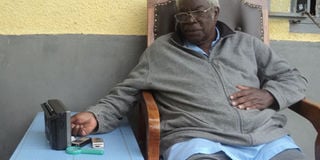Prime
Mushanga: a man who had the common man at heart

Professor Mwene Mushanga at his home.
What you need to know:
Although Musa Mwene Mushanga was a controversial figure when it came to religion, there was no doubt about his generosity
One can, with certainty, say Musa Mwene Mushanga lived as the sociologist he trained to be at various levels of his education, until the day he died, at the age of 84.
Mushanga who died last Wednesday worked as a Foreign Service officer, consultant on crime prevention, social researcher, community counsellor, public health educator, community organiser, teacher and human rights advocate.
According to www.soc.cornell.edu, sociology is a discipline that appeals to those who are ready to go beyond common sense explanations and challenge assumptions. The subject asks one to look at the familiar with a fresh perspective, to interrogate accepted understandings of the world and to critically evaluate widely-held ideas that might otherwise go unquestioned.
That is exactly how Mushanga approached the world. He did not always take things as they were and kept asking questions and trying to find alternative solutions. He was also a generous man and the impact of his service in the local community, at national and international levels is indelible.
Cause of death
The is said to have died of cardiac arrest and multiple organ failure. He passed away at Mbarara Regional Referral Hospital. He had been battling other illnesses, including high blood pressure and cancer that made him frequent Nakasero and Mulago hospitals, and South Africa for treatment.
Mushanga was a man who cherished both formal education and indigenous knowledge.
He always implored people in Sheema, where he came from, and Ankole to sacrifice whatever they had to, to take their children to school as he believed it was the best approach for transforming any society.
In this regard, he put up a school, Itendero Secondary School in Sheema District to provide quality education to the bright children from poor families, who could not afford to meet the high cost of education. The school is one of those institutions that showed his respect for education and concern for the underprivileged.
Mushanga was also part of the team that founded Ankole Western University in Kabwohe-Sheema seven years ago and he was the university project coordinator until the time of his death.
In a bid to ensure that many people received the basics of life, without prejudice, Mushanga always strived to discourage discrimination of any kind.
“He hated discrimination and that’s how he brought us up,” Mr David Ndyabarema, a son to the deceased, said, at the funeral service, held at Kakanju in Sheema, on Sunday, where many praised his works.
Princess Elizabeth Bagaaya of Toro Kingdom echoed that statement, saying that during a conversation when she visited Mushanga at his home, he told her: “There is no bad person on the earth; whether a Catholic, Muslim or Protestant.”
He was generally known to have goodwill and was genuinely interested in other people. He would tell those he interacted with, “A candle loses nothing by lighting another candle”, and that whoever has capacity or is in a better off position should always endeavour to pull up the one struggling or stuck.
He always found time to interact with people who would generally be considered as low class, including the drunkards in the town of Itendero. He engaged them in humorous jokes and tried to impart words of wisdom to them.
He also found no trouble in getting someone what they needed, even if sometimes he had to fork out from his wallet.
Mbarara Archdiocese Archbishop Paul Bakyenga spoke of a time when Mushanga once approached him to draw his attention to a woman who had lost both hands and yet she had five children to look after and therefore needed all the help she could get. When the archbishop could not get back to him after a while, because he was preoccupied with other engagements, he took the woman to America and secured her artificial hands.
He has been credited as a philanthropist, encyclopedia, and logician.
Prof. Ephraim Kamuntu quoted his late friend: “He used to say, ‘Never accept anything you are told, or anything you hear, anything you read without doubt. Doubt is the main path to truth, knowledge, social progress and, indeed, to civilisation.’”
He was a published author of many books including Crime and Deviance, Dictionary of Criminology, Slavery and Colonialism, and Criminal Homicide in Uganda.
He had many manuscripts that have not been published. He also authored poems, hymns and essays.
He, however, was not without controversy. Mushanga put himself at a distance with religion, saying he did not want to be called a Christian and then continue sinning. He was a fierce critic of some of the Christian teachings and believed that some of them did not help advance social and economic prosperity of Africans.
“I have failed to reconcile my concern for the poor and the biblical texts that warn people against their struggle to get out of poverty. The Bible says; ‘Blessed are the poor for they will inherit the kingdom of heaven.’ (Luke 6:20) Another passage says it is not possible for the rich to enter the kingdom of God.
That it is easier for a camel to go through the eye of the needle than a rich person to enter heaven. (Mathew 19:23-23).
“According to the above, the rich people of USA, Germany, Japan, Britain, Sweden and Switzerland will never go to heaven, and only the poor of the third world especially those of Mali, Malawi, Rwanda, Burundi, Togo, Sudan and Somalia will occupy the front pews of the seats in heaven. This kind of Christian message is misleading and must be discouraged openly,” Mushanga wrote in one of his essays.
Ms Jane Baine, the deceased’s daughter said her father was a bit too frank, and therefore courted some anger and bitterness from some people.
Honesty that got him enemies
“He was brutally honest. In fact my father had problems with those who never wanted to hear the truth,” said Ms Baine.
Sheema North MP Elioda Tumwesigye said the same, stating that Mushanga was empowered by truth: “Sometimes what he perceived as truth set him on a collision path with other people,” Dr Tumwesigye said of the former diplomat. In an interview with the Daily Monitor in April last year, Mushanga expressed disappointment with the job he was doing the for President and the country.
“I am an intelligent person. I cannot continue wasting my breath, advising the President when I know he will not do what I tell him. He is not advisable,” Mushanga said adding that on several occasions his advice to the President had been ignored.
President Museveni, who was the chief mourner, said Mushanga cherished quality and was a nonsectarian individual. The President said he had to adjust his busy schedule to attend his burial to give him honour.
He is survived by his wife Cissy Mushanga and they have five children (six passed on), 27 grandchildren and six great grandchildren.
About musa mwene Mushanga
He was born in 1930 at Kagango Sheema Ankole. He studied at Kabwohe, Mbarara High School and Makerere University where he obtained a Bachelor’s Degree in Sociology and Political Science, and a Master’s Degree in Sociology. He studied Criminology at the University of Wisconsin at Madison, USA. He taught sociology at Makerere University and while in exile he taught at the University of Nairobi from 1973 to 1979.
He was a UN consultant at the congress in Crime Prevention and treatment of offenders at Geneva. He attended many UN conferences on crime prevention. Prof. Mushanga was first appointed Uganda High Commissioner in 1986 to Zambia and then Zimbabwe, Bostwana, Lesotho and Swaziland. He served as Ambassador to Germany, Austria and the Vatican.
At the time of his death, Prof. Mushanga was a Presidential Adviser on Foreign Affairs and coordinator Ankole Western University at Kabwohe.”



